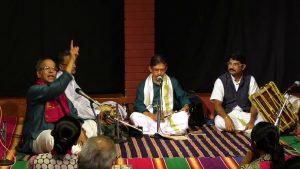Talamaddale
About Talamaddale
- The traditional art of ‘talamaddale’, an art form of coastal Karnataka, is a variant of Yakshagana theatre.
- The word Talamaddale is derived from the word ‘tala’ (Cymbal) and Maddale (the drum).
- While the Yakshagana has speech, dance and costume, talamaddale has only the spoken word with music being common between them.

- Hence, it is an art form minus dance, costumes and stage conventions.
Yakshagana
- Yaksha-gana literally means the song (gana) of a Yaksha.
- Yakshas were an exotic tribe mentioned in the Sanskrit literature of ancient India.
- The theater form was originally called Bayalata (open place play) or simply Ata (play).
- Yakshagana is a traditional dance drama popular in the coastal districts and adjacent areas of the state of Karnataka.
- Yakshagana is popular in the districts of Uttara Kannada, Shimoga, Udupi, Dakshina Kannada and the Kasaragod district of Kerala.
- Yakshagana combines dance, music, spoken word, elaborate costumes and makeup, and stage technique with a distinct style and form.
- It is generally regarded as a form of folk theater, but possesses strong classical connections.
- Yakshagana arose from the Vaishnava bhakti movement as a means of entertaining and educating the common people, and was well-established by the sixteenth century.
- A performance usually depicts a story from the Hindu epics of Ramayana and Mahabharata and the mythology of the puranas.
Why in News?
The Sanathana Yaksha Ranga Cultural Centre and Northern California Havyaka Group hosted a virtual talamaddale episode streamed live over the internet.
Reference:
https://yakshagana.com/talamaddale/
https://www.newworldencyclopedia.org/entry/Yakshagana
Subscribe
Login
0 Comments
